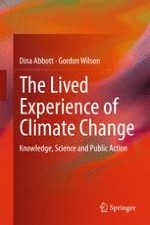2015 | OriginalPaper | Buchkapitel
2. Exploring the Lived Experience of Climate Change
verfasst von : Dina Abbott, Gordon Wilson
Erschienen in: The Lived Experience of Climate Change
Aktivieren Sie unsere intelligente Suche, um passende Fachinhalte oder Patente zu finden.
Wählen Sie Textabschnitte aus um mit Künstlicher Intelligenz passenden Patente zu finden. powered by
Markieren Sie Textabschnitte, um KI-gestützt weitere passende Inhalte zu finden. powered by
